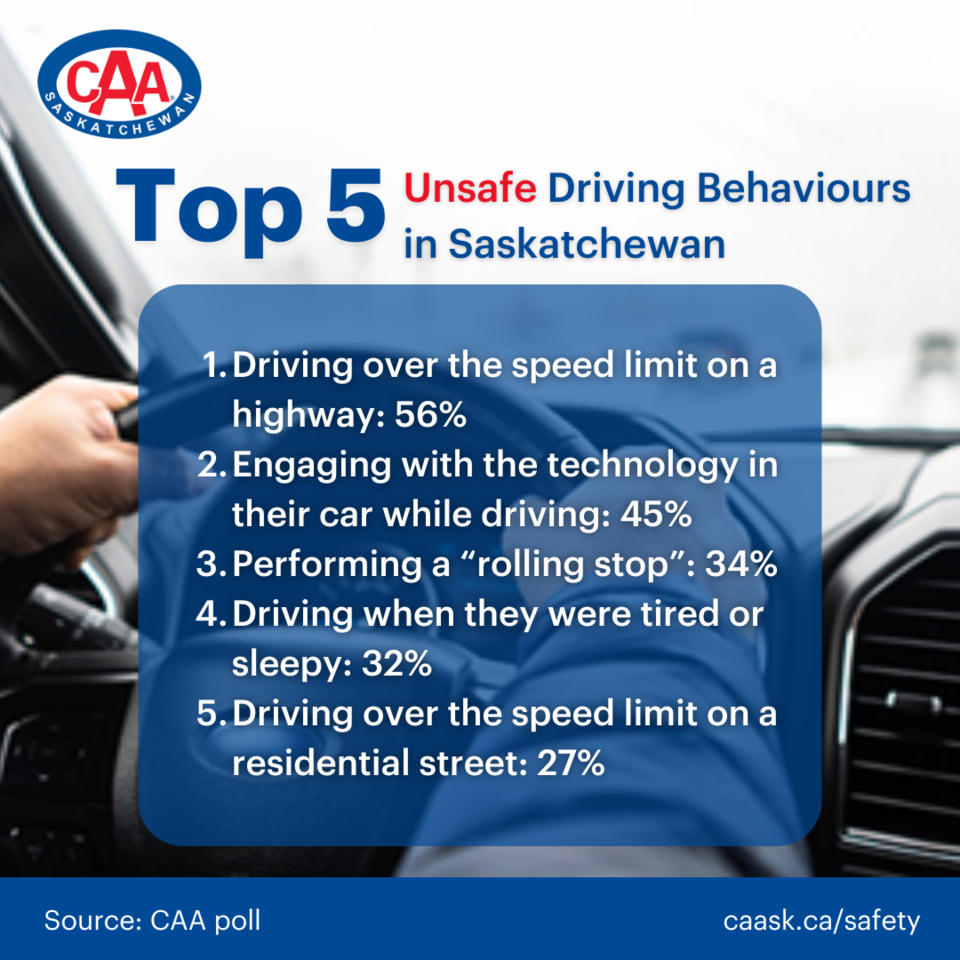REGINA — Seventy per cent of Canadians admit to speeding in a residential area at least once in the last year, half say they regularly speed on the highway and one in five drivers say they regularly drive well over the speed limit, according to new public opinion research from the Canadian Automobile Association (CAA).
“Higher speeds reduce drivers’ reaction time and increase the risk to themselves and everyone else,” said Kristine D’Arbelles, senior director, public affairs, CAA National.
“Speeding increases your stopping distance, making a collision more likely and severe, but it saves you only a small amount of time,” added Christine Niemczyk, director, corporate affairs and public relations with CAA Saskatchewan.
According to the Traffic Injury Research Foundation, travelling even 10 km/hr over the speed limit increases the likelihood of a collision by 60 per cent, while saving the average driver only four minutes on a trip.
The information comes from national polling conducted by CAA into drivers’ self-reported behaviour. On average in Canada, about a quarter of fatal collisions involve speeding, according to Transport Canada’s National Collision Database. “CAA encourages everyone to respect speed limits to help keep everyone safe,” says Niemczyk.
CAA’s poll also revealed that speeding isn’t limited to young people. While 50-plus drivers self-reported doing it a bit less, all age groups admitted to persistently going over the limit.
This attitude could be fueled by the fact that only 35 per cent of Canadians think they will get caught for speeding, according to the poll.
This research is part of CAA’s yearly survey of Canadians’ driving habits. The fall 2024 survey also found that nationally 4 in 10 Canadians admitted to running a red light, 68 per cent drove when they were too tired and 54 per cent admitted to using their phone while driving at least once in the last year.
Many people surveyed admitted that they do some unsafe things while driving in their vehicle that they probably shouldn’t be doing.
In Saskatchewan, the reported Top 10 unsafe driving behaviours, based on the survey results are:
- Driving over the speed limit on a highway: 56 per cent
- Engaging with the technology in their car while driving: 45 per cent
- Performing a “rolling stop”: 34 per cent
- Driving when they were tired or sleepy: 32 per cent
- Driving over the speed limit on a residential street: 27 per cent
- Programming a destination on their GPS or mobile device while driving: 26 per cent
- Driving well over the speed limit: 23 per cent
- Using their phone while driving: 17 per cent
- Didn’t shoulder check while driving: 15 per cent
- Driving aggressively: 14 per cent
CAA encourages everyone to practice the following safety advice to ensure you keep yourself and others safe:
- Remember that speed limits are posted for ideal weather. As we head into winter, with ice-and snow-covered roads and highways, we should try to respect the speed limit or slow down to ensure the safety of all.
- Keep a safe distance. Increasing the distance between you and the car ahead can help give you the time you need to recognize a hazard and respond safely.
- Drive slowly through community safety zones, school zones, and residential areas. Expect additional pedestrian or bike traffic in these zones and watch for children running across the road or darting out from between parked cars.
- Yield to pedestrians at crosswalks. Pay extra attention if you see someone is about to or has already entered the crosswalk.
- Be patient. Pedestrians with disabilities, children or seniors crossing the road may need more time to get to the other side.
The latest CAA findings are based on a poll of 2,880 Canadians carried out from September 13 to 21, 2024. A probability sample of the same size would yield a margin of error of +/-1.9 per cent.




